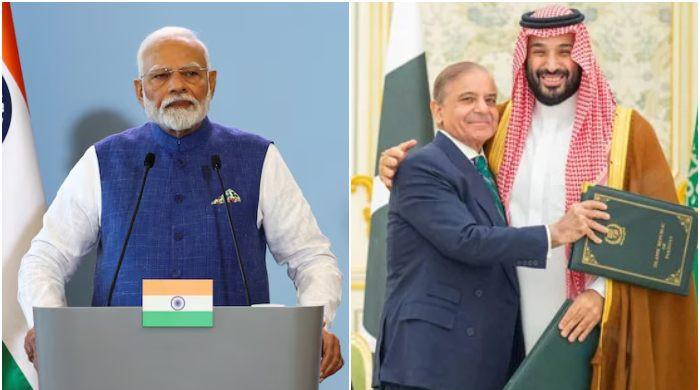- Govt committed to protect India’s national security: MEA spox.
- New Delhi to study impact defence pact for regional security.
- Pakistan, KSA to treat aggression against one as against both.
NEW DELHI: Reacting to the historic defence pact between Pakistan and Saudi Arabia, India has said that New Delhi will study the development’s implications with regard to its national security, regional and global security.
“We have seen reports of the signing of a strategic mutual defence pact between Saudi Arabia and Pakistan,” India’s Ministry of External Affairs spokesperson Shri Randhir Jaiswal said in a statement on Thursday.
“The government remains committed to protecting India’s national interests and ensuring comprehensive national security in all domains,” it added.
India’s reaction — to be interpreted against the backdrop of its hostilities with Pakistan in May — comes a day after Islamabad and Riyadh formalised a landmark Strategic Mutual Defence Agreement, pledging to treat any aggression against one country as aggression against both.
India had launched cross-border strikes into Pakistan, prompting the latter to first down multiple Indian Air Force (IAF) jets in retaliation, followed by the launch of “Operation Bunyan-um-Marsoos”. The conflict eventually ended after a ceasefire brokered by the United States.
The Pakistan-Saudi Arabia pact was signed during Prime Minister Shehbaz Sharif’s state visit to Riyadh on Wednesday, where he was received by Crown Prince and PM Mohammed bin Salman at Al-Yamamah Palace.
The pact reflects a joint commitment to enhance bilateral security ties and contribute to regional and global peace, the statement said. It aims to develop defence cooperation further and strengthen joint deterrence against any aggression. Crucially, the agreement stipulates that any aggression against one country shall be considered aggression against both.
The agreement was signed days after Israel launched a strike against Qatar, targeting Hamas leaders in Doha, a move that sparked outrage among Muslim nations and world leaders alike.
Experts have described the agreement as a “historic and unprecedented development”, elevating bilateral ties into a formal security commitment. They noted that while Pakistan has previously joined various defence pacts, this accord stands out for its binding clause that treats any aggression against either country as an attack on both.
The move, they argued, not only strengthens Pakistan–Saudi relations but also carries wider significance for South Asia and the Islamic world, positioning Pakistan as the most capable Muslim power to safeguard regional stability.
Analysts linked the timing of the agreement to recent regional turbulence, including Israeli strikes, the Doha summit, and heightened concerns across the Arab world about sovereignty and unilateral aggression. They said the pact underscores Saudi Arabia’s trust in Pakistan as its most reliable partner at a moment of escalating threats.
Defence analyst Sohail Muhammad Ali has termed the agreement a “historic development,” describing it as the most significant defence pact in Pakistan’s history.
He added that while Pakistan has previously been part of US-led pacts and alliances, the new agreement stands out for its binding clause that treats any aggression against either country as an attack on both.
Ali said the accord carries historic importance not only for Pakistan but also for South Asia and the broader Islamic world.
Highlighting its significance, he pointed to three key aspects: the current global environment marked by unilateral aggression, violations of international law, and infringements on state sovereignty.


